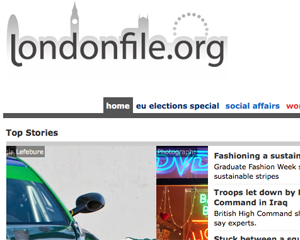Last week (Thursday May 28) Bloomberg’s former multimedia editor, Abhik Sen, spoke to journalism students at City University on a range of topics:
MPs’ expenses:
Revelations about MPs’ expenses would not have had as much impact if the story had been broken online, the former editor of multimedia at Bloomberg told students. “There are still some stories which work much better in traditional formats,” he said. “The MPs’ expenses story could have been broken in any format but it would not have had the same impact if it hadn’t been print.”
“The resulting chaos in Westminster probably would not have happened if it had broken on a blog or website. That medium just doesn’t have the same impact as the front page of a newspaper does.”
Sen added that the gradual ‘drip feed’ of information in the daily papers and sustained ‘wall-to-wall coverage’ in the Daily Telegraph allowed the story to build a momentum that would not have been possible in the rolling news environment of the web.
Where multimedia works best
He emphasised that online journalism continued to surpass traditional formats in providing ‘more detailed, more thoughtful’ coverage and a ‘360 degree view’ of any story.
“For the swine flu story, for example, you get the headlines in the newspapers and the footage on the television channels, but for a comprehensive view you have to go online and look at videos, stories, first person pieces, interactive graphics, maps,” he said. “That rule holds true for pretty much every big story, from Obama to climate change.”
“TV and newspapers are the entry point for the news cycle,” he added. “Only people who are particularly interested in a story will then go digging for more stuff online. But that’s when they will expect comprehensive, meaty content.
“Then, multimedia journalists have to take the game to the next level: beyond the headline, beyond the immediate soundbite.”
Sen’s tips for journalists
“In tomorrow’s world, which is pretty much today’s world, there is no media organisation which is not thinking multiplatform,” the former multimedia editor at Bloomberg. “Everyone will have to be a multimedia journalist of some sort. The earlier you get familiar with the grammar of multimedia, the easier and better it will be.”
- Planning is important. “Most bad multimedia pieces flounder because not enough thought has been put into what you are trying to communicate,” he warned. “Think about how your story could best be told and what sort of interactivity you want to offer.”
- Get creative. The challenge for multimedia journalists covering diary stories, such as the G20 protests, is to find a way of reporting that is “original, refreshing, different from the newspapers and television, and yet complimentary,” said Sen. “You must build on what others have done, but also do what others cannot do.”
- Think flavour, not just facts. “In a multimedia piece, you need to convey not just who was there and what happened, but what was it really like?” he said. “You need to capture things that make the piece alive. They might look small at production stage, but become really interesting and useful at the editing table.”
- Less is more. “Five minutes is an eternity in news time,” he warned. “Most multimedia pieces won’t ever run for more than a few minutes.”
- Always shoot action and emotion. “It doesn’t need to be someone fighting a war, but you need mobility or some dynamic element,” he advised. “It might be someone’s eyes floating from left to right, clinking glasses, natural sunlight.”
- Develop skills beyond conventional journalism, or work with somebody who has. “A graphic designer is critical to a multimedia project,” said Sen. “It’s up to them to bring all the elements together and present them in a way that can either make or break a multimedia piece.”
- Keep the big picture in mind. Remember that neither audio or visual will ever work alone in a final multimedia production. “They will be next to text, or on top of a picture, so always have an idea of the final product in mind,” said Sen. “Then you don’t always have to face the dilemma of dropping or cutting to fit.”
- But if in doubt: “Shoot first, make up your mind later,” he advised.
Sen, who spent more than a decade as a television and newspaper journalist before joining Bloomberg, added that these skills should be developed in addition to, not at the expense of, the traditional journalist’s toolkit. “The nuts and bolts remain the same. Good journalism, solid reporting, news judgement and good writing skills are as important online as off,” he said.
Sen’s favourite multimedia packages:
- Economy Tracker by CNN: “Somebody has done the hard work of crunching numbers and then somebody has made it into a really visual, interesting piece of work,” said Sen. “It’s a good example of telling a big story simply but effectively”.
Related link:
Alison Battisby’s report on her blog: ‘Everyone will be a multimedia journalist,’ says ex-Bloomberg editor.
Lara King is a freelance journalist and blogs on the media at www.lara-king.co.uk.

